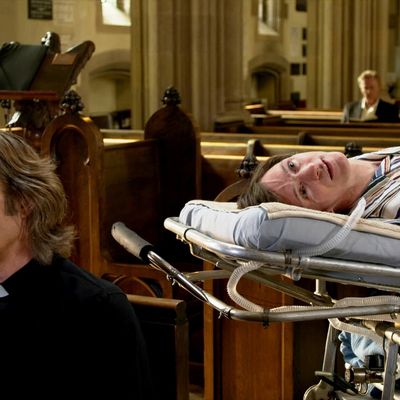
The newest disability-of-the-week Oscar-bait picture is The Sessions, and itÔÇÖs quirky and grounded enough to sneak past your more cynical defenses ÔÇö the kind that would lead you, say, to label it a disability-of-the-week Oscar-bait picture. Two things make you sit up, the first being that its 38-year-old Berkeley protagonist, Mark OÔÇÖBrien (John Hawkes), cannot: Paralyzed below the neck from childhood polio and almost never raised to a sitting position, he is largely seen at a 90-degree angle ÔÇö which creates, interestingly, a kind of poetic distance. The pathos isnÔÇÖt in-your-face. The second novel element is, in fact, the focus. Where other disability films ignore or dance around the question of how their subjects, as the Brits so delicately say, ÔÇ£manage it,ÔÇØ The Sessions dances right in. ItÔÇÖs a sexual coming-of-age movie. The original title was The Surrogate for its chief female character, Cheryl Cohen Greene (Helen Hunt), hired by Mark to teach him how to give and receive pleasure, which means they get nekkid together. Relax, itÔÇÖs legal ÔÇö even wholesome.
One reason the ÔÇ£ick factorÔÇØ is almost nonexistent is that Mark is both endearing and witty. A devout ÔÇö rather traumatized ÔÇö Catholic, he explains his belief in God like so: ÔÇ£I would find it absolutely intolerable not to be able to blame someone for this.ÔÇØ Hawkes bears little resemblance to his meth-fueled uncle in WinterÔÇÖs Bone or Manson-like cult leader in Martha Marcy May Marlene. His features are relaxed and his voice is minus chest tones. It all seems to come from his nose ÔÇö he sounds like Liberace. A virgin with some notoriety as a poet and essayist, Mark, who has a habit of pining in vain for his dishier female attendants, asks for his priestÔÇÖs blessing to do it with it a surrogate, explaining that heÔÇÖs coming close to his ÔÇ£use-by date.ÔÇØ The long-haired Father Brendan is played by William H. Macy, whom I didnÔÇÖt buy for a second. But there wasnÔÇÖt a second I didnÔÇÖt love him and his hangdog deadpan as he tries to remain impassive while Mark gives him more detail than he wants to hear. Gazing at Jesus above the altar, the priest says, ÔÇ£I feel like heÔÇÖll give you a free pass on this one.ÔÇØ Amen.
Writer-director Ben Lewin, a 66-year-old best known for TV dramas and comedies in Australia, the U.K., and Hollywood (I wonÔÇÖt hold Touched by an Angel against him), takes a simple, almost matter-of-fact approach thatÔÇÖs buoyed by Marco BeltramiÔÇÖs sprightly score. It fits the performances of Hawkes and Hunt, who sheds her clothes so easily that you forget to be embarrassed. She manages to make her patter (ÔÇ£WeÔÇÖll start with some body-awareness exercisesÔÇØ) sound neither robotic nor coy but perfectly appropriate: Her body says ÔÇ£NC-17ÔÇØ but her words are ÔÇ£PG-13.ÔÇØ (The MPAA split the difference and gave the picture an R.) ItÔÇÖs nice to see Hunt again. She was overused for a couple of years, played some bum roles, and dropped out for a spell. Seeing her here reminds you how plain-in-a-good-way she can be, the emotions rising up as if by their own power and breaking through her studiously levelheaded surface. Mark, of course, falls (so to speak) for Cheryl, and Cheryl, in a way, for Mark. What they do about it as their sessions (theyÔÇÖre limited to six) draw to a close is sudden and moving. I watched Hunt trying to hold back the tears and cried before she did.
The briskness of The Sessions works against it: It lacks the fullness of the best films of its ilk, chief among them Jim SheridanÔÇÖs My Left Foot. But Lewin lets his eye wander pleasingly. As one of MarkÔÇÖs attendants, Moon Bloodgood has a lovely poker face that once or twice gives her hand away, and her scenes with Ming Lo as a well-dressed motel desk clerk (she sits with him while Mark and Cheryl have their sessions behind closed doors) are sweet little studies in flirtation and repression. Mark OÔÇÖBrien was a real guy, and I think heÔÇÖd be pleased that his story has been told as a good comedy with tears instead of a by-the-numbers weeper with laughs.


